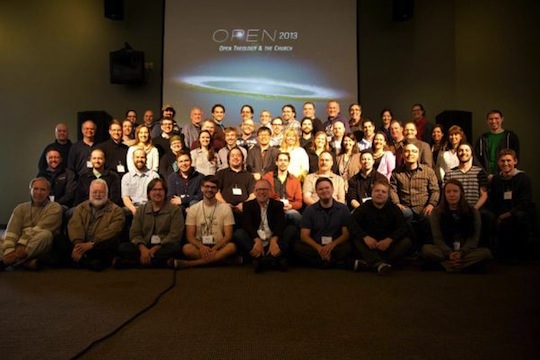We run our website the way we wished the whole internet worked: we provide high quality original content with no ads. We are funded solely by your direct support. Please consider supporting this project.
Reflecting on Open2013
 T. C. Moore has posted some of his reflections from the Open Theism conference. T. C. was one of several people who pulled this conference together and he did a great job. He’s also incredibly smart and very active in the open view community. Also, he’s a young church planter in Boston and I’m sure he’s grieving with the rest of that city (and the world) after the bombings yesterday. Our hearts are broken with him. Lord Jesus bring your peace and reveal your heart in the aftermath of this tragedy.
T. C. Moore has posted some of his reflections from the Open Theism conference. T. C. was one of several people who pulled this conference together and he did a great job. He’s also incredibly smart and very active in the open view community. Also, he’s a young church planter in Boston and I’m sure he’s grieving with the rest of that city (and the world) after the bombings yesterday. Our hearts are broken with him. Lord Jesus bring your peace and reveal your heart in the aftermath of this tragedy.
From T. C.’s blog:
The conference was held at Woodland Hills Church and senior pastor Greg Boyd was one of the conference’s keynote speakers.John Sanders and Thomas Jay Oord also delivered keynote talks. All three keynote speakers did a fantastic job, and each one provided substantive Q&A sessions following their talks. Dr. Oord even integrated Q&A into his presentation making it extraordinarily interactive. But one undeniable highlight of the conference was Jessica Kelley‘s sharing of Henry’s Story. Her testimony of how the Open View and the Warfare Worldview has helped her process her pain and preserved her faith in God was definitely the emotional pinnacle of the conference. Several of us on the planning team noted her poise during Q&A and her powerful gift of clear communication.
Category: General
Tags: Boston Bombings, Open Theism, T.C. Moore
Related Reading

My Car Crash and the Open View
Last Saturday night Shelley and I were involved in a rather serious four car crash on a local highway. One person was hospitalized, and I’m being treated for neck pain and an on-going dull headache. But thankfully, no one was critically injured. In any event, the crash inspired several folks to e-mail or tweet questions…

What is the significance of Jeremiah 18:7–11?
The Lord states that “if that nation, concerning which I have spoken, turns from its evil, I will change my mind about the disaster that I intended to bring on it.” But if a nation which he has declared he will bless “does evil in my sight…I will change my mind about the good that…

What is the significance of Isaiah 5:3–7?
The Lord describes Israel as his vineyard. Referring to himself, he says that the owner of the vineyard loved his vineyard and did all he could to care for it. “[H]e expected it to yield grapes, but it yielded wild grapes” (vs. 2). Then the Lord asks, “What more was there to do for my…

What Unfulfilled Prophesies Say About the Open View
Image by Lori Greig via Flickr Yesterday, we posted about how Messianic prophesies are understood in the open view of the future. Today, this post will look at prophesies that are not fulfilled in the way predicted and what that can tell us about the open view of the future. In John Goldingay’s excellent multi-volume work, Old…

The Case for Including Open Theism Within Arminianism
Here is an excellent post by my good friend Roger Olson in which he makes the case that Open Theism should be embraced by Arminians as an orthodox, if somewhat non-traditional, form of their faith. In fact, Roger argues (rightly in my opinion) that Open Theism is much closer to the “heart” of Arminianism than…

Lord Willing? Part 3
In this final segment of Greg’s discussion with Jessica Kelley about her book Lord Willing?, Jessica talks about how to respond to someone who is grieving or in crisis. You can find part 1 here and part 2 here. We’re so grateful that Jessica took the time to share her story with us. We know…
